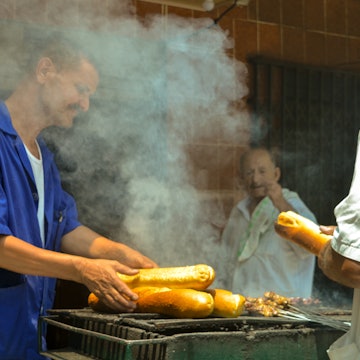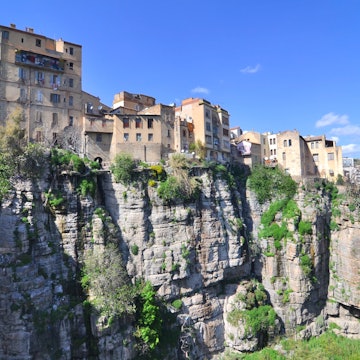

Sunlight over Assekrem, Algeria. Elias Temer/Shutterstock
Getting around Algeria is possible by plane, train, bus, car or even camel. No matter how you choose to travel, there’s one essential thing every visitor should remember to pack: a bit of patience.
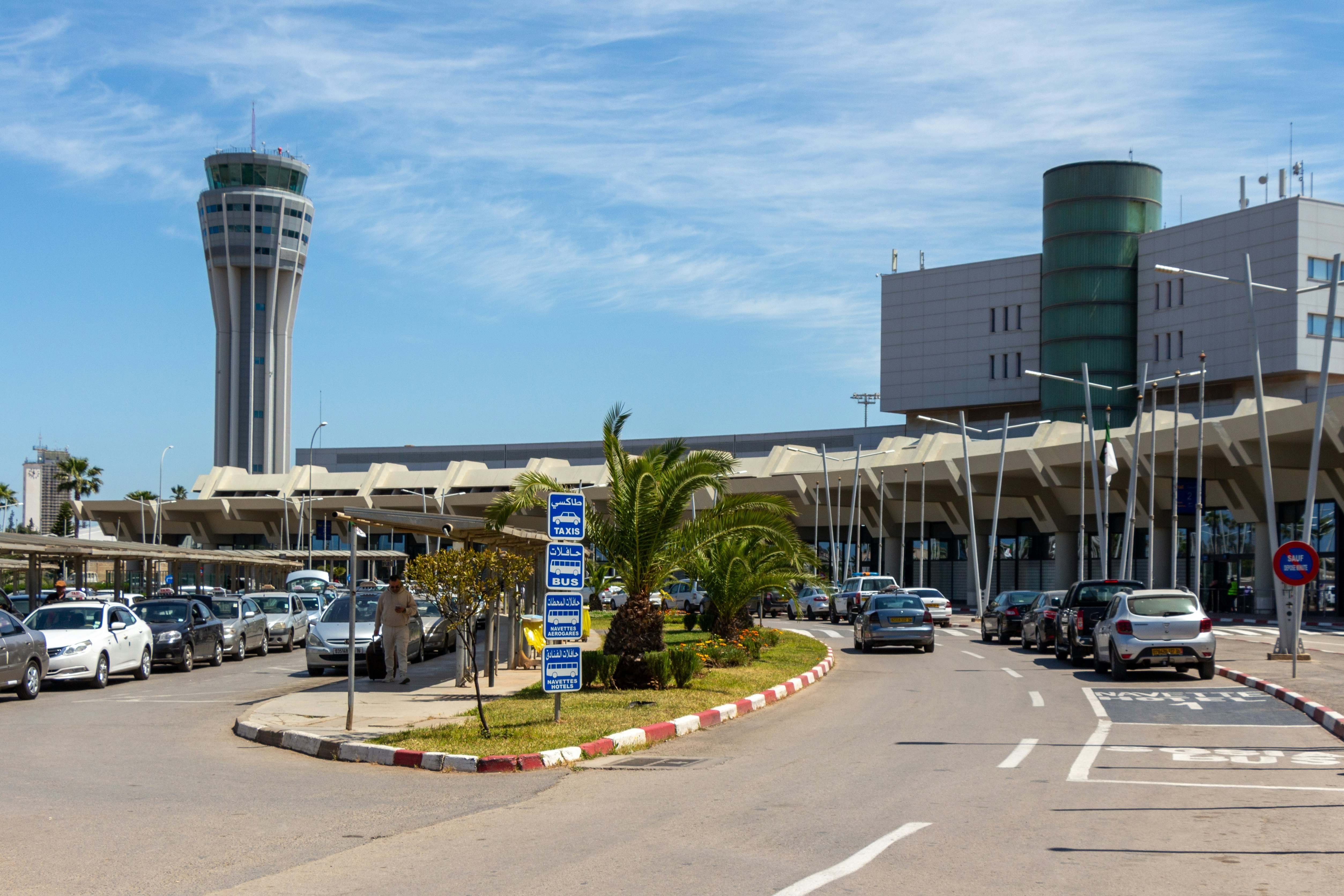
Flying is the fastest way to see Algeria’s wonders
Many visitors underestimate the sheer scale of Algeria, Africa’s largest country. Fly from Paris to Djanet via Algiers, and you’ll find that the international and domestic legs each take 2½ hours. This makes air travel by far the most efficient way to see Algeria, especially for those hoping to cover as much ground as possible. Algeria’s national carrier, Air Algérie, services an extensive network of domestic routes and is generally reliable. If you’ll be traveling in the north, perhaps to cities like Oran, Tlemcen, Constantine or Annaba, flying is primarily a time-saving convenience, with flight times typically taking around 1 hour.
Unless driving more than 2000km through the Sahara is your idea of fun, flying is the only realistic way to reach remote destinations such as Djanet and Tamanrasset. Book flights to Saharan cities well in advance – they often sell out between October and May.
Local tip: Booking domestic flights from outside Algeria is straightforward, but trickier once you’re in the country. In Algeria, the Air Algérie website is geared to locals and only accepts Algerian debit cards. If you haven’t booked before arrival, try a third-party site, visit an Air Algérie office to pay by cash or card, or call customer service to give your card details over the phone.
Hit the road but buckle up
If you’ve never driven in a place where the rules of the road are routinely ignored, you might want to leave driving in Algeria to the brave. But if you are feeling courageous, road trips can be a great way to see hidden gems in Algeria. Once you’re out of the city, well-maintained highways give you access to secluded beaches and mountain villages, otherwise difficult to reach without a car.
If you are planning to rent a car, the agencies at the airport are often your best option, regardless of which city you’re in. As Algeria is a cash-based economy, you won’t be able to pay the deposit by card, so come prepared.
Another perk of driving is that, aside from the cost associated with renting a car, gas in Algeria is extremely affordable, with a litre costing around DA40 (US$0.30). It’s so cheap, in fact, that bottled water is often more expensive.
Checkpoints are a regular feature of driving in Algeria. They’re routine, part of daily life and no cause for concern. When approaching, turn your music down, have your International Driving Permit handy, and, at night, turn on your interior lights. More often than not, you will be waved through, but if you are stopped, chances are the officers are just curious about you being a foreigner.
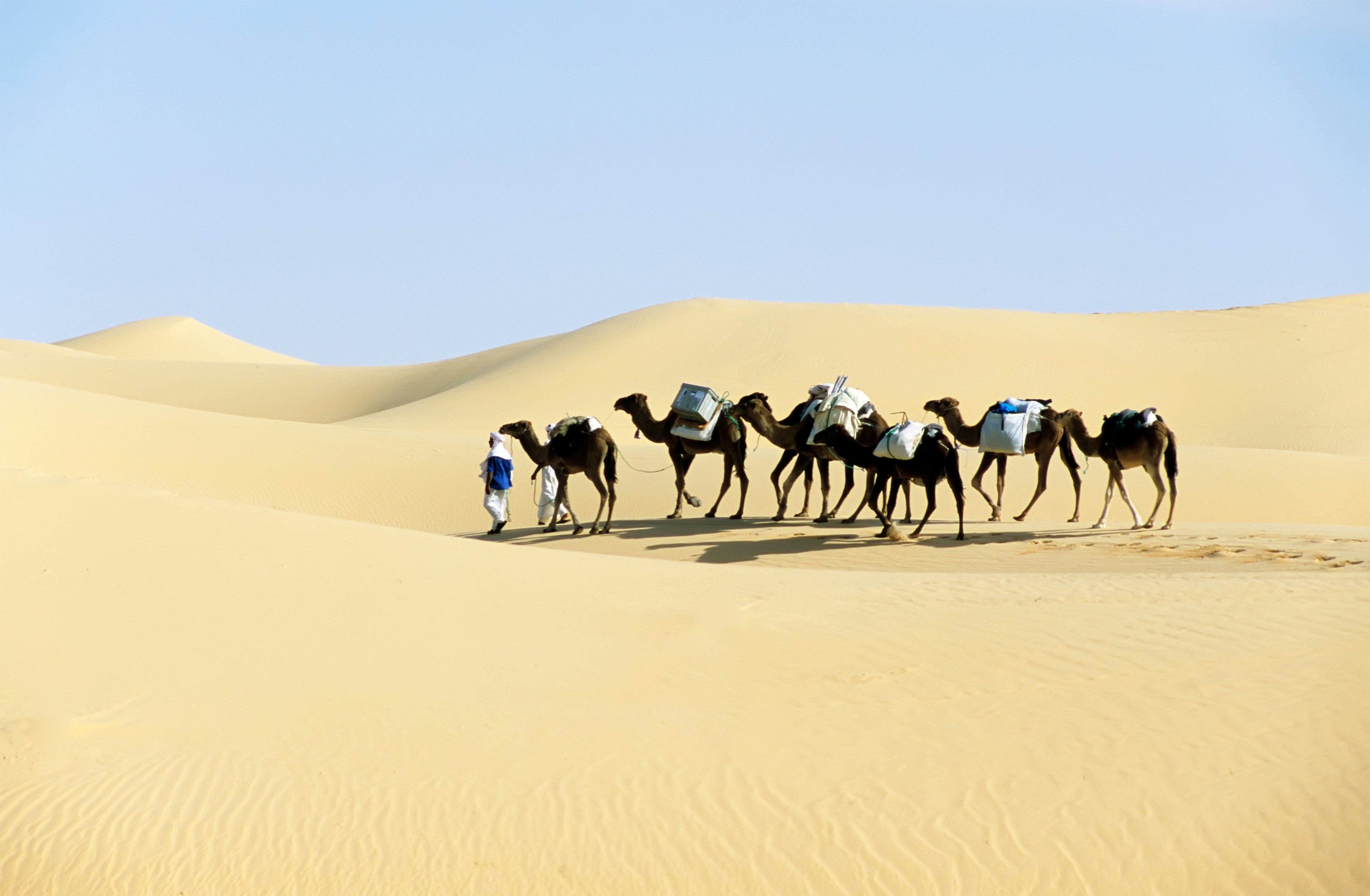
Connect with nature through a camel trek
For the adventurous traveler, camel treks transform your journey into the destination. Most common in desert destinations like Djanet and Tamanrasset, travel by camel was once the main form of transportation for the Tuareg people, a nomadic indigenous group in southern Algeria.
Today, there are two types of camel treks. The first is the méharée, which involves traveling primarily on camelback. Second is the randonnée, where travelers spend most of the trip on foot, with the camels used for transporting gear and the occasional respite. Travel on camelback is typically longer, lasting up to weeks for those willing to embrace the desert life.
If you are concerned about the ethics of camel riding, be sure to seek out a Tuareg-led trek. Local agencies work directly with nomadic camel drivers whose camels live in the desert full-time, roaming freely in their natural habitat. Choosing to travel by camel also benefits local communities, as many nomads rely on tourism as their sole source of income.
Take a rideshare over a taxi
Taxis are one of the most accessible and commonly used forms of transportation in Algeria, especially in big cities like Algiers, Oran and Constantine. There are two types of taxis: private taxis and shared taxis (taxis collectifs), with the latter only serving fixed routes. Many private taxis don’t run meters, so you’ll need to agree on a price ahead of time. For solo female travelers, traveling by taxi could pose different risks, such as harassment. If possible, travel with a companion and avoid traveling at night.
In recent years, ridesharing apps like Yassir, inDrive and Heetch have taken over Algeria. The advantage of using them is that there is no risk of being charged more than the local rate. With inDrive, users have the option to set their price and negotiate with drivers directly in the app. Unlike ridesharing apps abroad, payment is accepted in cash only. While using these services is generally safe, most drivers are not officially registered taxi drivers, which may be a concern for some travelers.
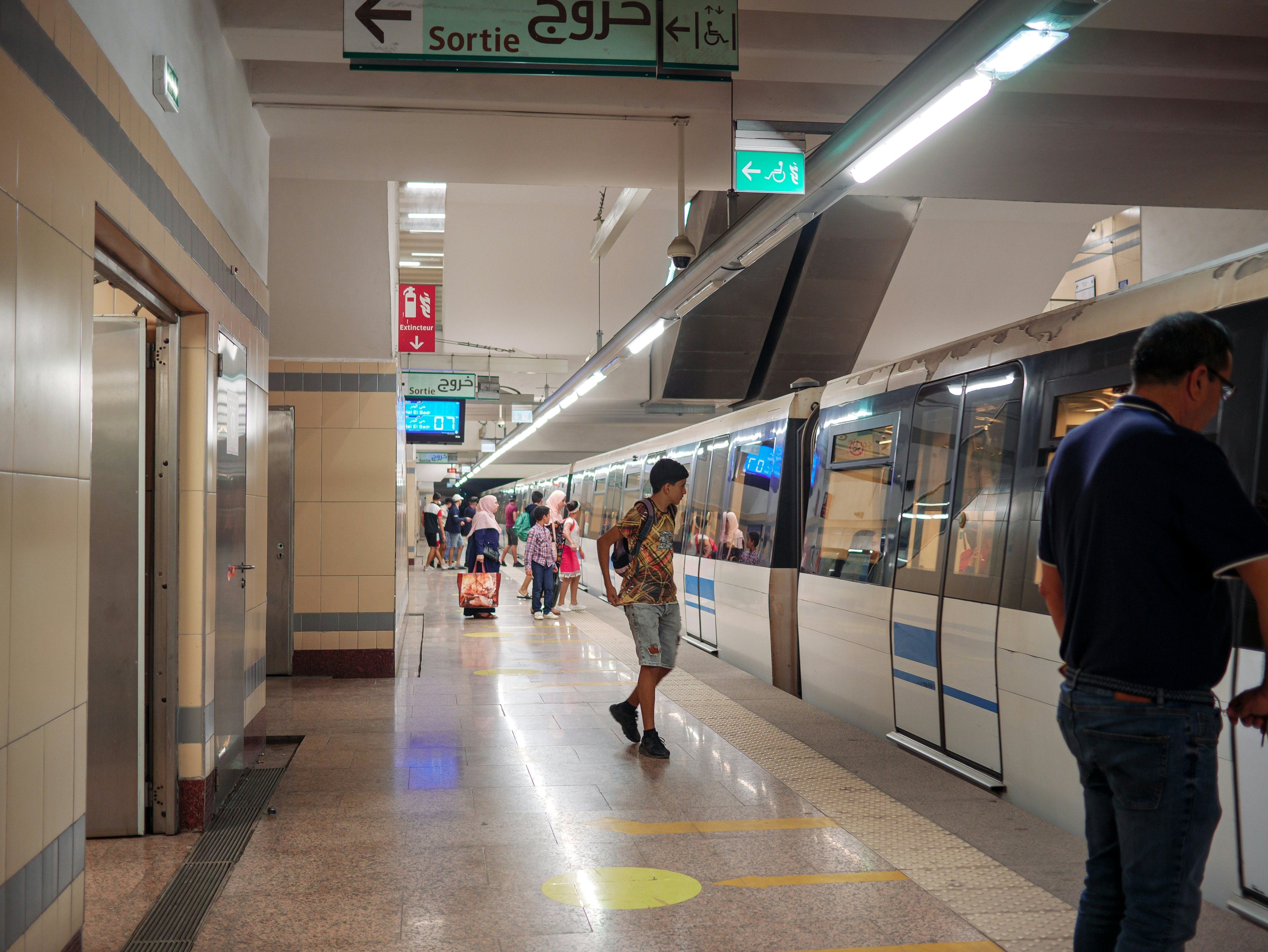
Hop on public transit, hope to arrive on time
Public transit in Algeria is budget-friendly and offers a window into the daily life of locals. The one caveat is that you may face delays or cancellations.
Algiers is home to the Maghreb’s first metro system, the only rapid transit system in Algeria. The Algiers metro connects key parts of the capital and is a reliable, clean and affordable way of getting around. A single ride on the metro costs DA50, but a 24-hour pass will cost you DA150 – if you’re spending the day exploring, the day pass is the way to go.
There is an extensive network of intercity buses operated by private companies, with conditions ranging greatly in quality. As Algeria is a cash-based economy, it will be necessary to go to the main bus station to purchase your ticket. Unless you're on a tight budget, other forms of transportation are recommended, as some buses can be overcrowded and lack comforts like air-conditioning.
While trains offer a scenic and affordable way to travel, you pay the price in time. Managed by the Société Nationale des Transports Ferroviaires (National Railway Transport Company), the 4500km rail network dates back to the colonial era and connects most northern cities. Despite the appeal of the train routes and low fares – a first-class ticket from Algiers to Oran costs DA1700 (US$13) and a second-class ticket costs DA1350 (US$10) – the delays can derail your whole trip, sometimes by many hours. Still, if you're not in a rush and open to a more spontaneous travel experience, rail travel can be a memorable way to see the country.
Accessible transportation in Algeria
Accessibility in transportation in Algeria remains limited and unaccommodating for travelers with reduced mobility. Most public transportation modes, like buses and trains, lack ramps and elevators, making accessibility difficult or even impossible without assistance. Some neighborhoods, like the Casbah, can only be reached by climbing steep staircases, and some sidewalks throughout Algeria are uneven or poorly maintained. The newer Algiers metro has more widespread accessibility features, but it is the exception to the rule. Travelers with disabilities may need to rely on private transportation or air travel to navigate the country.







